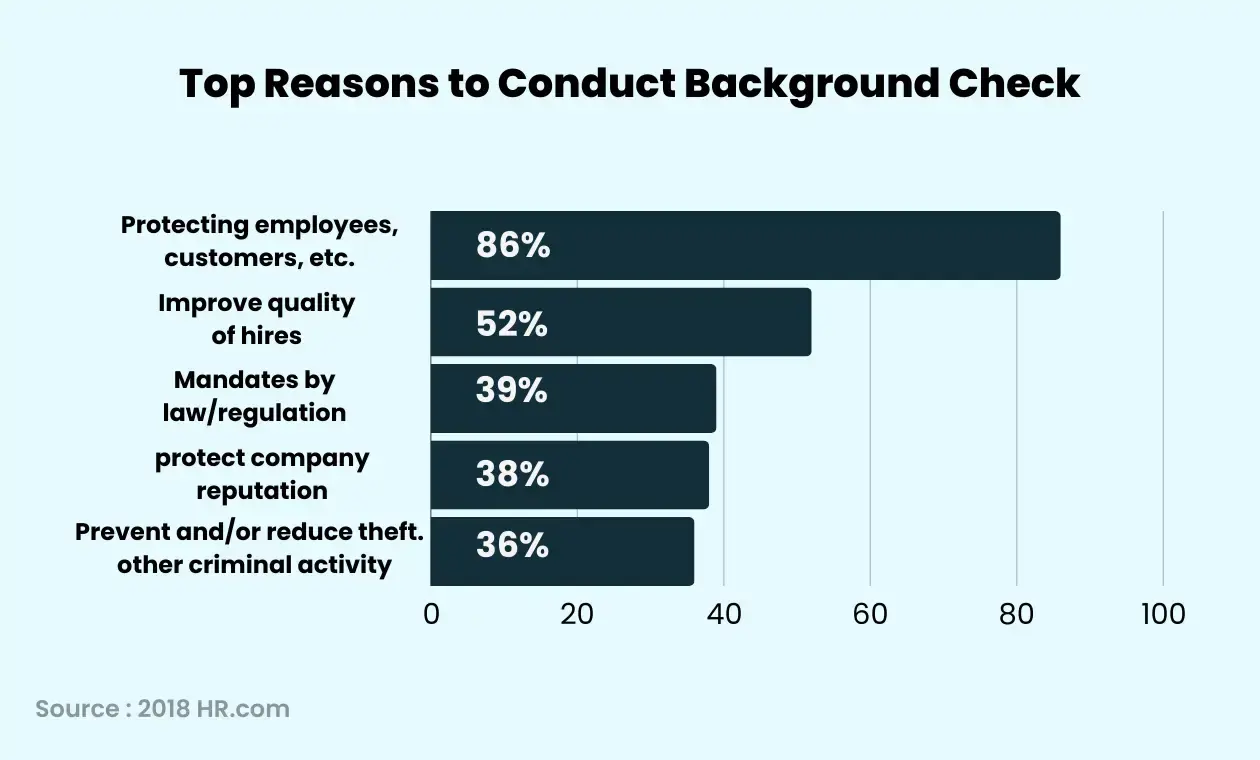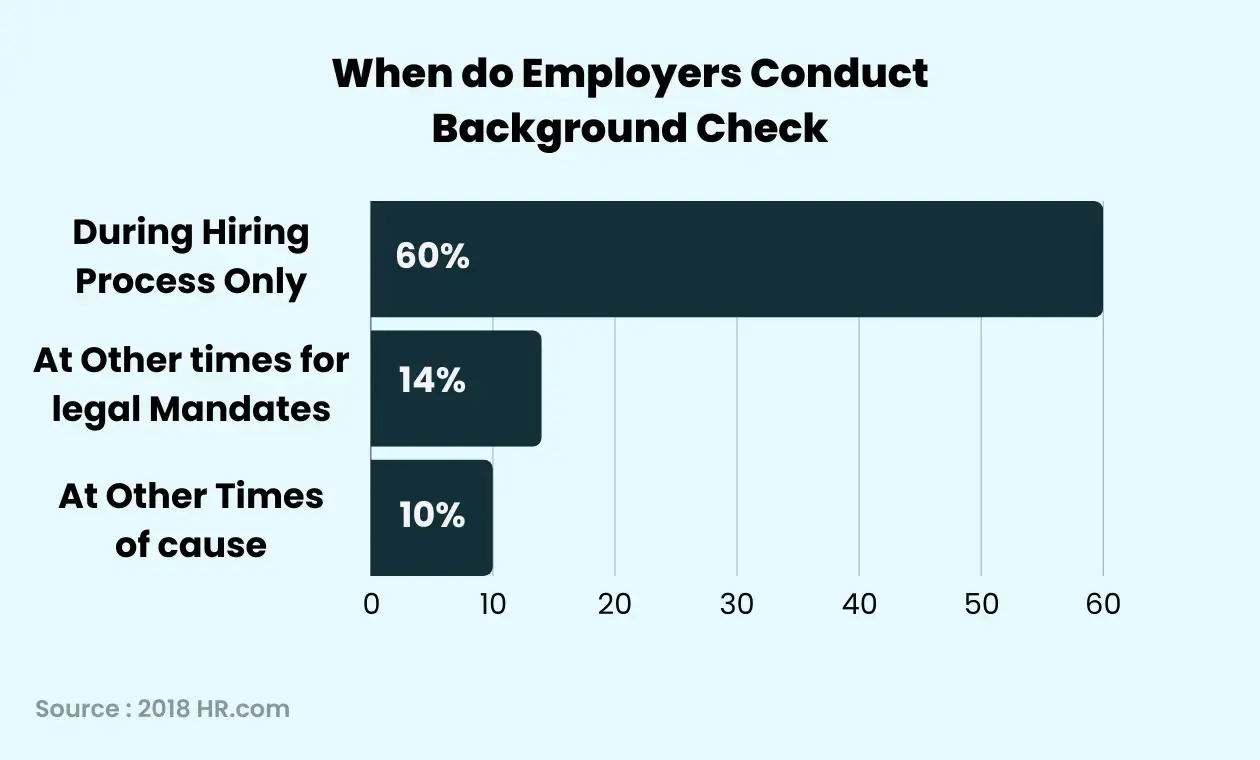TL;DR
- Pre-employment background checks are essential to verify candidate information and reduce hiring risks.
- Employers must comply with legal requirements, including obtaining written consent and adhering to state and federal laws.
- Consistency and fairness in the screening process are crucial to prevent discrimination claims.
- Candidates should be given the opportunity to explain any negative findings before final decisions.
Introduction
Hiring the right talent is a great investment for the business and a crucial step for any organisation. Hence, in order to know if a candidate is right for the organisation, background check and reference check processes occur. To ensure a candidate is suitable, companies often carry out checks to verify their background and references.
These checks help reveal important information that might not be clear from interviews or resumes alone. If you are also conducting the hiring process and need to learn about the pre-employment background check methodology, then you’re in the right place.
Here, you’ll learn what a pre-employment background check is, why it is essential and what the best practice for it is.
They provide insight into a candidate’s history, allowing employers to make informed decisions and protect their investment in new staff. This process supports organisations in building a reliable and trustworthy workforce.
Whenever businesses conduct the recruitment process, their primary goal is to hire a great employee who stays with them for a long period and adds significant value to the organisation.
Unfortunately, some of the new hires turn out to be bad hires. These bad hires cost the company a lot in terms of money, time, and other resources.
Pre-employment background checks play a key role in reducing the risk of hiring mistakes. It is one of the best ways to avoid bad hiring. Through a pre-employment background check, companies can easily uncover hidden details or information that the candidate is trying to keep hidden.
Key Takeaways
-
Background checks help verify candidate information and suitability.
-
They reduce risks associated with poor hiring decisions.
-
Best practices improve the effectiveness of screening processes.
What is a Background Check?
Employers conduct a candidate's background check to confirm the information provided in the application and resume and to disclose potential issues. Therefore, a background check allows employers to investigate various aspects of candidates, including their criminal records, employment history, and other past activities, to verify their validity. The only purpose of a background check is to make the best hiring decision.
What are the Common Types of Background checks?
1. Employment background checks
2. Criminal background checks
3. Universal background checks
4. OIG background checks
5. E-verify background checks
6. Fingerprint background checks
7. International background checks
8. Credit background checks
9. Personal background checks
10. Professional license background checks
Why Are Pre-Employment Background Checks Important?
Employers who fail to investigate the background of a candidate generally face the view of an unsatisfactory hiring decision, especially for risk-sensitive positions.
The pre-employment background check is conducted for several key reasons, primarily to gather accurate information. Let's talk about other reasons that encourage employers to perform pre-employment background checks.
-
To supply the best and safest workplace for employees and customers.
-
Help employers hire the right candidate who contributes to the growth of the business instead of destroying it.
-
To decrease exposure from employee responsibility by functioning with "due diligence" in the hiring process.
-
In order to appreciate the loyalty and honesty of the candidate during the recruitment process.
-
To teach a lesson to the candidates with hidden information or dishonesty.
-
Remove the uncertainty from the hiring process.
-
Protect the reputation of the business.

To prevent this, most employers conduct a background check on every new employee before they're hired. Those who do background checks are analysing these aspects:(Source)
|
Screening Area |
Percentage of Employers Checking |
| Criminal background | 81% |
| Employment history | 70% |
| Identity | 53% |
| Education qualifications | 51% |
| Drug use | 39% |
| Professional licences | 36% |
| Credit history | 21% |
7 Best Practices for Pre-Employment Background Checks
Pre-employment background checks are a critical component of the hiring process. Job applicants must be screened extensively to determine if they are the best fit for the job, and conducting background checks is the best way to do that.
What every employer must remember when conducting a background check on a potential hire is that it must be done judiciously. Otherwise, the company risks liability for hiring discrimination, privacy violations, and more.
Here are the best practices all employers must follow to avoid any unwanted problems or legal issues:
1. Comply with State and Federal Regulations
State and federal laws govern the practice of conducting background checks on job applicants. Ensure your process fully complies with these laws to protect you and your company from any liability.
Employers must ensure their background check process is in line with both state and federal laws. This helps avoid legal problems and protects the company. When using a third-party service, it is important to comply with the Fair Credit Reporting Act (FCRA). This act sets clear guidelines on how background checks should be handled.
2. Secure Written Consent from Candidates
The FCRA requires employers to notify and obtain written permission from potential hires prior to conducting background checks. In addition, employers must inform applicants that the information obtained through the search may be used for hiring decisions.
Candidates need to be informed that the information found may affect the hiring decision. Without this permission, conducting the check could lead to legal trouble.
3. Clearly Define the Extent of Background Investigations
Before conducting a background check, it is essential to be specific about what you are looking for. A full background check can be expensive and time-consuming, so it is best to focus on key areas such as employment history, education, criminal records, and driving licences, depending on the job requirements.
Employers should decide what parts of the candidate’s history they want to investigate. If conducting a detailed “investigative report” that looks at personal aspects like reputation and lifestyle, candidates must be told this in advance.
Outline the important details that you will need, such as the applicant's work history, educational background, criminal records, credit report, any type of driving license, such as a category AM license, and more.
Also, according to the FCRA, applicants must be informed of their right to a complete description of the nature and scope of the background check if it is an "investigative report," which is a very detailed background check that includes information about a more personal nature that scrutinizes the applicant's character, general reputation, and overall lifestyle.
4. Maintain a Consistent Screening Process
The screening process must be consistent with everyone. Requiring background checks for some applicants while not requiring them for others is a surefire way to open your company up to the legal implications of discrimination, especially if your basis for requiring the background check on certain applicants has anything to do with race, gender, religion, disability, or age preference.
Treating candidates equally during screening is essential. Running background checks for some applicants but not others can lead to claims of discrimination. The process should be fair and apply to everyone seeking the same type of role. However, the depth of checks can be adjusted by job type; higher-risk roles may require more thorough investigations.
To avoid breaking any federal non-discrimination laws, always treat job applicants fairly and equally by subjecting them to the same screening process.
You may scale background searches according to the position available, as some positions may pose a higher risk to your company and therefore require a more extensive background search.
5. Give them a Chance to Clarify Their Consequences
If the background search reveals negative information that may cause you to reject the applicant, employers should allow the candidate to respond before making a final decision and give them a chance to explain or clarify before making a final decision.
This will help protect your company from liability, as making an adverse hiring decision based on the background search without discussing it with the applicant can have negative consequences.
This practice also helps prevent unfair rejection and protects the company from legal claims. Candidates might provide context or correct misunderstandings, which can affect the outcome.
As comprehensive as a background search may be, it may still have its limitations in terms of telling the whole story.
6. Conduct Thorough Criminal History Checks
Most employers are generally predisposed to reject job applicants with criminal backgrounds, but this should not be the case. Adopting a blanket policy that bans all applicants with criminal records from gaining employment can be harmful to your company, as it can lead to charges of unlawful discrimination. It is best practice to conduct a legal criminal background check via a third party.
Employers must not apply blanket bans on candidates with criminal histories. Each case should be considered individually, ensuring decisions align with laws preventing discrimination.
Criminal history exclusions need to be related to the job and business needs. This ensures the choice to reject a candidate is based on relevant risks connected to the position.
According to the U.S. Equal Employment Opportunity Commission (EEOC), the employer must be able to show that its decision to reject applicants based on their criminal history is "job-related and consistent with business necessity." This is further explained in the EEOC's Enforcement Guidance on the Consideration of Arrest and Conviction Records in Employment Decisions Under Title VII: "To establish that a criminal conduct exclusion that has a disparate impact is job-related and consistent with business necessity under Title VII, the employer needs to show that the policy operates to effectively link specific criminal conduct, and its dangers, with the risks inherent in the duties of a particular position."
7. Ensure Relevance and Fairness in Background Assessments
Some companies opt to perform background checks in-house, but most prefer outsourcing to third-party providers that conduct investigations and compile comprehensive background reports.
If you choose to do the latter, work with a reputable background check software provider to ensure that each report contains relevant, accurate, and verified information. Also, it is critical that your chosen provider is FCRA compliant.
Many employers choose to hire specialists for background checks. Using a reputable and compliant third-party provider helps guarantee reports are correct and relevant. Employers should ensure reports are reliable and legally compliant, especially with the FCRA and other regulations.
When conducting a pre-employment background check on a job applicant, ensure that every action and decision you make complies with all applicable laws and regulations. Follow best practices and stay informed about relevant legislation to ensure your company's safety from potential legal issues.
How Do You Handle if the Candidate is a Red Flag?
If a background check uncovers red flags, it doesn’t automatically mean you have to reject the candidate. It’s important to approach the situation carefully and fairly. Here’s how you can handle it:
First, consider the nature of the red flag. Is it a serious issue, like a criminal record or falsified credentials, or is it something less severe, like a minor traffic violation? Not all red flags are deal-breakers, so you’ll want to evaluate how relevant the issue is to the role they’re applying for.
Next, give the candidate a chance to explain. Sometimes, there’s more to the story than what shows up on paper. For example, there could have been a misunderstanding or a situation they’ve already addressed and moved on from. A simple conversation can give you a better understanding of their side.
|
Concern Level |
Suggested Approach |
Example |
| Minor | Consider explanation; may not impact role | Minor traffic violations |
| Moderate | Evaluate the candidate's response carefully | Employment gaps |
| Serious | Consider the risk to the role and legal aspects | Criminal history |
If the red flag is something serious, you’ll need to weigh the risks. For roles that require a high level of trust, such as those handling sensitive information or finances, certain offences may be more concerning. In those cases, you might need to think twice before moving forward.
Finally, make sure you’re following legal guidelines. Laws like the Fair Credit Reporting Act (FCRA) require that you notify candidates of any adverse actions you take based on their background check. This helps you avoid legal issues and ensures transparency.
In short, treat red flags as part of the decision-making process, not the final say. Every situation is different, so it’s important to be fair, ask questions, and make informed decisions.
Final Thought about Pre-Employment Background Checks
So there you have it: 7 straightforward steps to make sure your pre-employment background checks are thorough, fair, and effective.
Remember, the goal is to create a safe and productive workplace for everyone, and taking the time to properly screen candidates is a big part of that.
Always get consent, stay within the law, and keep the process fair and consistent for everyone. It's crucial to dig deep but stick to what's relevant to the job – no need to pry into personal matters.
Communication is key, so keep candidates in the loop and handle any findings with care and confidentiality.
Remember, everyone makes mistakes, so consider each situation fairly and give candidates a chance to explain. Lastly, don't forget to secure the collected data properly.
Frequently Asked Questions(FAQs)
1. What is a pre-employment background check, and why is it important?
It’s a process to verify a candidate’s history and ensure they’re suitable for the role. It helps employers make informed hiring decisions and avoid costly mistakes.
2. What types of background checks are common?
Common checks include employment history, criminal records, education, identity, credit, and professional licenses.
3. Is candidate consent required?
Yes, employers must get written permission before conducting a background check.
4. How should red flags be handled?
Employers should assess the issue’s relevance and give candidates a chance to explain before making a final decision.
5. What are the best practices for background checks?
Follow legal guidelines, be consistent, focus on job relevance, and use trusted providers.














.webp)


